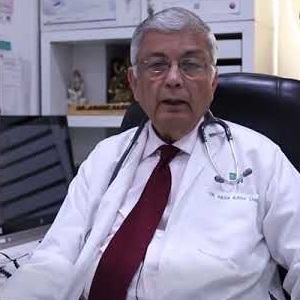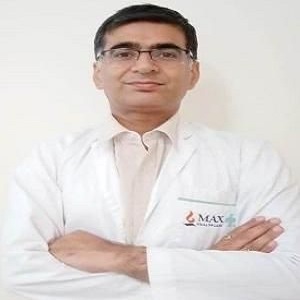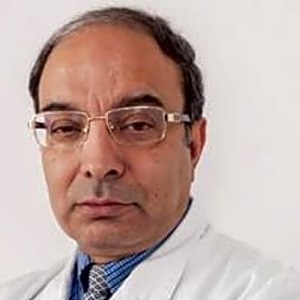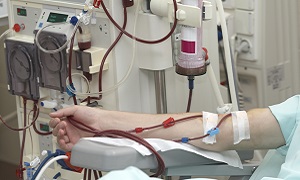Best Doctors in India for Polycystic Kidney Disease Treatment
- Nephrologist, Gurugram, India
- Over 25 years’ experience
Profile Highlights:
- Dr. Lakshmi Kant Tripathi throughout his career has supervised around 54000 hemodialyses at different centers in Delhi NCR, with great clinical outcomes.
- He is successfully engaged in kidney transplantations, including Incompatible & High-risk ones. He is a specialist in managing Resistant hypertension, difficult-to-treat Nephrotic Syndromes, Complicated UTIs & high-risk Transplants.
- Nephrologist, Gurugram, India
- Over 40 years’ experience
Profile Highlights:
- Dr. Manju Aggarwal is one of the leading nephrologists in India and has many years of experience in Nephrology at some of the best medical institutions including the University of Minnesota.
- She has expertise in treating critically ill patients with acute and chronic renal failure and those on dialysis and renal transplant.
- Dr. Aggarwal is also experienced in managing difficult and high-risk renal transplants, especially for those who need desensitization.
- Nephrologist, New Delhi, India
- Over 22 years’ experience
Profile Highlights:
- With over 22 years of experience, Dr. Saurabh Pokhriyal is currently associated with Manipal Hospitals in Dwarka, Delhi. Known for his skill in Nephrology and Renal Transplant Medicine, Dr. Saurabh Pokhriyal has a distinct fascination with complex cases of nephrology as well as in performing ABO-contrary transplants.
- He has worked additionally for the Primary treatment of Glomerular Diseases. Dr. Pokhriyal has also authored several articles that have been distributed in different national as well as international chapters and books.
- Nephrologist, New Delhi, India
- Over 45 years’ experience
Profile Highlights:
- Dr. Ashok Sarin is a specialist in Kidney Diseases, Dialysis, and Transplantation. He is currently working at Indraprastha Apollo Hospital, Sarita Vihar, New Delhi.
- After receiving his education at the All India Institute of Medical Sciences, New Delhi, Dr. Ashok Sarin proceeded to Northern Ireland U.K. where he received training under Dr. Mary Mcgeown at the prestigious Belfast City and Royal Victoria Hospital Queens University of Belfast U.K. He is known to receive World Class Training in treating all types of Kidney Diseases, Hemodialysis, CAPD, and Live and Cadaver Kidney Transplantation.
- He is a member of several associations such as the Indian Society of Nephrology, Delhi Nephrology Society, North Zone Society of India, as well as the Association of Physicians of India. He is also the President of the Delhi Nephrology Society.
- Nephrologist, Gurugram, India
- Over 18 years’ experience
Profile Highlights:
- Currently working as Associate Director, Nephrology at Medanta, Gurugram; Dr. Jha has several years of rich experience in his field.
- His area of expertise is renal transplantation, hemodialysis, chronic kidney diseases, and acute kidney injury. Throughout his career, he has treated thousands of patients from all over the country and also provides his patients with the best medical care.
- Dr. Jha completed DNB Nephrology from Manipal Hospital; Bengaluru in 2011. He has wide experience in pre as well as post-transplant care.
- Nephrologist, New Delhi, India
- Over 30 years’ experience
Profile Highlights:
- Dr. Alka Bhasin is a General Physician as well as a Nephrologist and a Renal Specialist, based in Saket, New Delhi. She completed her Fellowship in Nephrology from Thomas Jefferson University Hospital in 2000.
- Some of the services provided by Dr. Alka Bhasin include Hemodiafiltration (HDF), Kidney Transplant, Renal Angioplasty & Stenting, Laparoscopic Nephrectomy, Hemodialysis, etc.
- Nephrologist, Chennai, India
- Over 14 years’ experience
Profile Highlights:
- Dr. Jagdish K is currently designated as the Senior Consultant of Nephrology with a vast experience of 14 years.
- Dr. Jagdish K is well versed in Temporary Haemodialysis Catheters, Bone Marrow Aspiration and Biopsy, Lumbar Puncture, Arterial Lines, and Renal Biopsy.
- His special interests lie in Glomerulonephritis, Extracorporeal treatments, Post-Transplant Infections, and Renal Transplants across blood groups and in highly sensitized individuals.
- Nephrologist, New Delhi, India
- Over 20 years’ experience
Profile Highlights:
- Dr. Rahul Grover is known to be one of the finest renal doctors and nephrologists in New Delhi. He offers excellent care to all his patients.
- He holds an experience of several years and has extensive knowledge in the field of medicine.
- He is also an esteemed member of the Indian Society of Nephrology (ISN), and the Indian Society of Organ Transplantation (ISOT), and this further adds to his credibility.
- Nephrologist, Gurugram, India
- Over 15 years’ experience
Profile Highlights:
- Known as one of the best nephrologists in the NCR region, Dr. Manish Jain holds a special interest in renal transplants as well as clinical nephrology.
- His compassionate patient care and lifestyle advocacy have helped patients recover from various disorders.
- Throughout his career, Dr. Manish Jain has published several papers in India and is also a member of several medical associations.
- Nephrologist, Gurugram, India
- Over 31 years’ experience
Profile Highlights:
- Dr. Vijay Kher is a well-known nephrologist with over 31 years of experience. He did his MBBS from Glancy Medical College, Amritsar. He completed his DNB – General Medicine from the Postgraduate Institute of Medical Education and Research, Chandigarh in 1977.
- Some of the services provided by Dr. Kher are ABO Incompatible Transplantation, Steroid Free Immunosuppression, Clinical Immunosuppression, Kidney Disease Treatment Acute Renal Failure, etc.
Best Hospitals in India for Polycystic Kidney Disease Treatment
Fortis Hiranandani Hospital, Mumbai
- City: Mumbai, India
Hospital Highlights:
- Fortis Hiranandani hospital was established in 2007.
- The hospital is an advanced tertiary care, multi-specialty hospital equipped with 149 beds.
- The hospital is equipped with a super ICU to provide emergency medical care to critically ill patients.
- The hospital is NABH accredited.
- The critical care facility in the hospital is augmented with the state-of-the-art facilities that facilitate speedier diagnosis and efficient monitoring.
- The hospital provides specialty medical services in cardiology, orthopedic science, pediatric science, neurology, diabetic care, urology, nephrology, ENT, obstetrics, gynecology, cosmetic surgery, bariatric surgery, neuro and spine care.
Fortis Hospital, Anandpur, Kolkata
- City: Kolkata, India
Hospital Highlights:
- Fortis Hospital, Anandapur, Kolkata is a world-class super-speciality equipped with the latest technologies in the medical world.
- The hospital is NABH accredited.
- This state-of-the-art facility specializes in cardiology and cardiac surgery, urology, nephrology, neurosciences, orthopaedics, digestive care, emergency care and critical care.
- The hospital, governed by integrated Building Management System (IBMS), has a pneumatic chute system, for quick vertical and horizontal transportation between floors, facilitating speedy transfer of patient specimens, documents, reports, and medicines to the concerned departments.
- The hospital also has a nephrology department with over 28 advanced dialysis units.
Fortis Hospital Banerghatta, Bengaluru
- City: Bengaluru, India
Hospital Highlights:
- Fortis Hospital Bannerghatta, Bengaluru was established in 2006.
- The hospital is a 276 bedded multi-specialty tertiary care facility.
- The hospital specializes in cutting-edge medical technology and dedicated patient care services.
- The hospital is equipped with state-of-the-art technologies like trans-radial angioplasty, trans-abdominal cardiac surgery, and computerized TKR navigation surgery.
- The hospital provides specialty medical services in cardiology, cardiac surgery, orthopedics, neurology, neuro-surgery, GI, and Minimal Access Surgery (MAS).
Fortis Hospital, Malar, Chennai
- City: Chennai, India
Hospital Highlights:
- Fortis Malar was established in 1992 and was formerly known as Malar Hospital.
- The hospital specializes in cutting-edge medical technology and dedicated patient care services.
- The hospital is multi-specialty, tertiary care facility with 180 beds.
- The hospital offers comprehensive medical care in specialties such as cardiology, cardio-thoracic surgery, neurology, neurosurgery, orthopedics, nephrology, gynecology, gastroenterology, urology, pediatrics, and diabetes.
Gleneagles Global Hospital, Parel, Mumbai
- City: Mumbai, India
Hospital Highlights:
- Gleneagles Global Hospital The 450-bed facility comprises of 17-stories, housing state-of-the-art infrastructure, and advanced medical care facilities.
- The hospital offers end-to-end clinical, surgical, and diagnostic services. It is equipped with a team of eminent medical professionals aided by qualified nurses and medical staff
- The Hospital offers advanced Endoscopic procedures, Hepatobiliary and Liver Surgeries, Surgical and Medical Gastroenterology, Bariatric Surgery, and Robotic surgery.
- The hospital is a center of excellence for Orthopedics, Joint Replacement, Knee Replacement, and Hip Replacement surgery.
Manipal Hospital, Dwarka, Delhi
- City: New Delhi, India
Hospital Highlights:
- Manipal Hospitals, Dwarka, is a super-specialty hospital in Dwarka, New Delhi, which is a part of Manipal Hospitals Group.
- The hospital aims to provide the best treatment on par with international standards at a fraction of the cost.
- Equipped with 380 beds, the hospital is also one of the new age hospitals which are equipped fully with state-of-the-art infrastructure, cutting-edge technology as well as the latest and advanced clinical practices. The hospital also has 13 modular Operation theatres with 118 beds which are solely meant for critical care.
- The hospital comprises internationally acclaimed doctors and highly professional and experienced hospital and medical staff who are able to provide preventive, therapeutic, and diagnostic services all under one roof.
Paras Hospital, Gurugram
- City: Gurugram, India
Hospital Highlights:
- Paras hospital was established in 2006 and is the 250 bedded flagship hospital of Paras Healthcare.
- The is supported by a team of doctors of international and national repute.
- The hospital is NABH accredited and also the first hospital in the region to have a NABL accredited laboratory.
- The hospital provides specialty medical services in around 55 departments including Neurosciences, Joint Replacement, Mother & Child Care, Minimal Invasive Surgery, Gynecology and Obstetrics, Ophthalmology, Dermatology, Endocrinology, Rheumatology, Cosmetic and Plastic surgery.
- The hospital is equipped with state-of-the-art technologies.
S L Raheja Hospital, Mahim, Mumbai
- City: Mumbai, India
Hospital Highlights:
- SL Raheja hospital is a 140-bed multi-specialty tertiary care hospital that is being managed by Fortis Healthcare Ltd.
- The hospital is a benchmark in healthcare and medical facilities in the neighborhood of Mahim & the western suburbs.
- L.Raheja Hospital, Mahim has one of the most effective ICU and Casualty care services.
- The hospital provides specialty medical services in Cardiology, Oncology, Neurology, Orthopedics, Mother & Child Care, and in Diabetes.
Wockhardt Hospitals, Mumbai
- City: Mumbai, India
Hospital Highlights:
- Wockhardt Hospitals were established in the year 1973, originally called First Hospitals and Heart Institute.
- Wockhardt Hospitals are super specialty health care networks in India, nurtured by Wockhardt Ltd, India’s 5th largest Pharmaceutical and Healthcare company.
- Wockhardt Hospitals is associated with Partners Harvard Medical International, an international arm of Harvard Medical School, USA.
- Wockhardt Heart Hospital performed India’s first endoscopic heart surgery.
- The hospital has a state-of-the-art infrastructure equipped with the latest technologies and modern equipment.
- It has special Centers of Excellence dedicated to the major specialties to provide hassle-free and high-quality clinical care.
Pushpawati Singhania Hospital & Research Institute, New Delhi
- City: New Delhi, India
Hospital Highlights:
- Established in 1996, Pushpawati Singhania Research Institute is one of the top hospitals in the NCR region, as well as one of the top facilities in India for gastroenterology. The hospital is one of South Asia’s first institutes in medical and surgical treatment for diseases related to digestion.
- The hospital is equipped with state-of-the art facilities coupled with the latest equipment as well as renowned consultants from various parts of India as well as other parts of the world.
Polycystic Kidney Disease
Symptoms
In many cases, people can live with PKD for years, without experience any signs and symptoms, which are associated with the disease. A cyst typically needs to grow half an inch or larger before you might be able to notice any symptom of the disease.
Some of the symptoms of this ailment include:
- Blood in the urine
- Frequent urination
- Pain or heaviness in the back
- Pain or tenderness in the abdomen
- Skin that bruises easily
- Fatigue
- Pale skin color
- Pain in the sides
- Urinary tract infection
- Kidney stones
- Joint pain
- Nail abnormalities
If you notice yourself or anyone close to you, develop any signs or symptoms of polycystic kidney disease, then it is best to see your doctor as soon as possible.
Types & Causes
Polycystic kidney disease is generally inherited. Although, in a few cases, it may develop in people having other serious kidney problems. The three main types of PKD include:
Autosomal Dominant PKD (ADPKD)- Autosomal dominant PKD, which is also termed adult PKD, accounts for around 90 percent of the cases. People having a parent with PKD has a 50 percent chance of developing this condition.
Symptoms generally occur later in life, between the ages of 30 and 40, though few people can begin to experience symptoms in childhood as well.
Autosomal Recessive PKD (ARPKD)- Autosomal Recessive PKD is much less common as compared to ADPKD. It is also inherited, but to develop ARPKD, both parents must carry the gene for the disease.
Carriers of ARPKD won’t show any symptoms if they have only one gene. However, they will have ARPKD if they inherit two genes from each parent. Four types of ARPKD exist, which include:
- Prenatal form, which is present at birth.
- Neonatal form can occur within the first month after birth.
- Infantile form can occur when a child is 3 to 12 months old.
- Juvenile form can occur after a child is 1 year old.
Acquired cystic kidney disease- Acquired cystic kidney disease (ACKD) is not inherited and it generally occurs at a later stage in life.
This condition is generally seen in people who are already having other kidney problems. It is more common among people having kidney failure and people who are on dialysis.
Diagnosis
Since ADPKD and ARPKD are inherited, the doctor will first need to review your family history. They might initially need to order a complete blood count in order to look for anemia or any other signs of infections.
To diagnose all three types of PKD, your doctor can use imaging tests to look for cysts of the kidney, liver, and other organs. Imaging tests that are used to diagnose PKD include:
Abdominal Ultrasound
Abdominal CT scan
Abdominal MRI scan
Intravenous Pyelogram
Treatment
The severity of this condition can vary from person to person, even among the members of the same family. Generally, treating polycystic kidney diseases involves treating the signs, symptoms, and complications in the early stages.
Kidney Cyst Growth
Pain
Declining Kidney Function
High blood pressure
Blood in the urine
Bladder or kidney infections
Kidney failure
Aneurysms
If you are suffering from polycystic kidney disease and a family history of ruptured brain aneurysms, then your doctor might recommend regular screening for intracranial aneurysms.
If an aneurysm is discovered, then surgical clipping of the aneurysm to reduce the risk of bleeding may be an option, depending on its size. There are non-surgical treatment options as well, such as controlling high blood pressure, and high blood cholesterol. Quitting smoking is also quite beneficial.
Complications
Several complications are associated with polycystic kidney disease. They include the following:
- High blood pressure- A common complication of polycystic kidney disease is elevated blood pressure. If high blood pressure is untreated, it can cause further damage to your kidneys and may increase the risk of heart disease or stroke.
- Chronic pain- Pain is another common symptom among people with polycystic kidney disease. It generally occurs in your side or back. It is also possible that the pain is associated with a urinary tract infection, a kidney stone, or a malignancy.
- Loss of kidney function- A progressive loss of kidney function is known to be one of the most serious complications of polycystic kidney disease. Nearly half of the patients suffering from PKD have kidney failure by the age of 60. This happens because PKD can interfere with your kidneys’ ability to keep wastes from building to toxic levels. As the disease worsens, end-stage kidney disease may occur, which can require you to undergo dialysis or a transplant.
- Growth of cysts in the liver- If you are having polycystic kidney disease, then you are more likely to develop liver cysts, as your age increases. While both men and women develop cysts, cysts in women are often larger. Female hormones and multiple pregnancies can also contribute to liver cysts.
- Heart valve abnormalities- Around 25 percent of adults with polycystic kidney disease develop mitral valve prolapse. When this happens, the heart valve no longer closes properly, and this can allow blood to leak backward.
- Development of an aneurysm in the brain- A balloon-like bulge in a blood vessel in your brain can cause bleeding i.e. hemorrhage if it ruptures. People suffering from polycystic kidney disease usually have a higher risk of aneurysms. People with a family history of aneurysms are at the highest risk. You can talk to your doctor to ask if screening is needed in your case.
- Pregnancy complications- Most women having polycystic kidney disease are generally able to have a successful pregnancy. However, in some cases, women can develop preeclampsia, a life-threatening disorder. Those having high blood pressure or a decline in kidney function are more likely to develop it.
- Colon problems- Weaknesses and pouches or sacs in the wall of the colon i.e. diverticulosis can also develop in people who are having polycystic kidney disease.
Prevention
One of the best ways to prevent some of the complications of PKD is to keep your kidneys as healthy as you can.
Some of the tips to keep your blood pressure in check include eating a diet low in salt, and containing plenty of fruits and vegetables, exercising regularly and maintaining a healthy weight, quitting smoking, and reducing alcohol consumption.
























